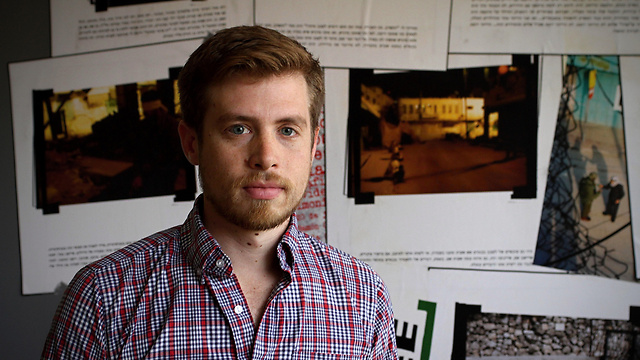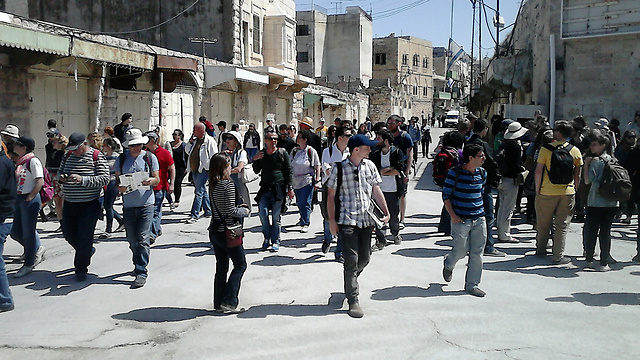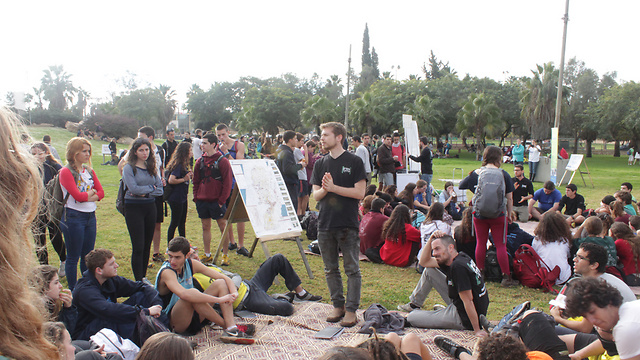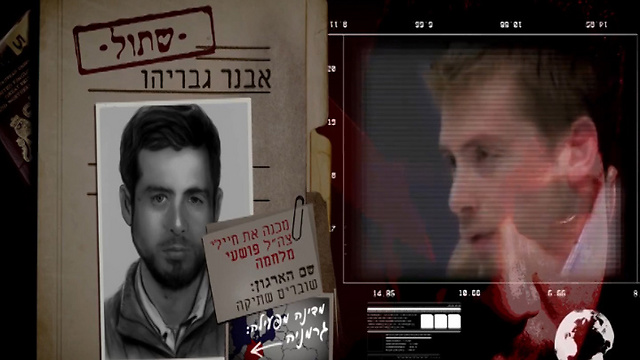He is the ‘star’ of the aggressive Im Tirzu campaign against Breaking the Silence, but has so far preferred to keep quiet. Now, Avner Gvaryahu is fighting back: he responds to his comrades who accused him of lies, talks about the threats to his life, and explains why his organization actually helps Israeli hasbara abroad.
Im Tirzu’s “plants” campaign was launched when Avner Gvaryahu was in New York, where he is doing his Master’s degree. Lucky for him, because his face, photoshopped into a threatening image and plastered on graphics that flooded social media, became the one most identified with the campaign against Breaking the Silence. In an instant, Gvaryahu became one of the most threatened and hatred people among large parts of the Israeli public, almost all of whom had never heard his name before that campaign.
Over the past week, Im Tirzu and other right-wing organizations escalated their fight against Gvaryahu himself. In a video that features members of his Orev Paratroopers unit, they accused him of spreading lies. Firstly, they denied Gvaryahu’s claim about indiscriminate fire on Arab neighborhoods in Hebron that was done from atop of a hill overlooking the city, and of the use of “a machine gun, whose operator would play a sort of video game and shoot at innocent people and vehicles.”

Secondly, they claimed the story about the unit invading a Palestinian apartment and tying up the residents so they could watch a World Cup game was false, because they were not in Hebron at the time. Thirdly, they admitted that a team from the unit was on operational duty during the World Cup final, but claimed the house was selected based on operational parameters, and insisted the Palestinian family was treated kindly, were not tied, and watched the game with the soldiers.
‘We have been judged and convicted’
Now, Gvaryahu has decided to break his silence. In an exclusive interview with Yedioth Ahronoth he confronts the hard questions, gives his version of things, and talks about the threats to his life.
We talk on the phone, at a late afternoon hour in New York. Gvaryahu sounds relatively calm considering the maelstrom around him, carefully chooses his words, but does not hesitate to attack back.
“Over the past few months, I feel like there has been an ongoing trial in Israel, and my friends and I have been convicted already, regardless of the facts,” he says. “Personally, I experienced difficult, bad things, insults, threats. The hatred from this campaign does not go out into the void; it all comes down on me, my friends, my family. The thing I have the hardest time dealing with is the fact I got everyone around me into this. Literally everyone, against their will.”
How do you feel with your comrades’ claims and their personal attacks against you?
“It was very hard on me. I served with these guys. We went through basic training, advanced training and unit training together. I stand behind what I said, and the things I presented were just the tip of the iceberg. Those who don’t want to be untrue should look inwards; they know what I’m talking about.”
They claim the unit you served in was the picture of morality.
“That’s not it. I don’t think Orev is an immoral unit. Out of most IDF units, in Orev, and generally in the Paratroopers, there are a lot of good guys who want to be moral soldiers. I wanted to be a moral soldier too. That’s the very basic principle of what we’re talking about in Breaking the Silence. There’s no doubt we wanted to be good. I remember guys washing the floors in houses after operations, and people who left money for Palestinian families. But you can’t ignore the wearing routine of occupation, the unnecessary violence directed at Palestinians, and the taking of souvenirs from homes. I would very much like to open this topic for discussion. I heard there are those talking about filing a lawsuit against me and against Breaking the Silence. That’s fantastic! It would be a great opportunity to discuss these things, for people to take responsibility over what they saw and did.”

What about your comrades’ claims that you accused them of things they didn’t do?
“That’s a lie, I’ve never accused them specifically. With regards to the incidents I described, we have videos that show grenade launcher being fired at Hebron during the second intifada. As for the takeover of an apartment to watch the World Cup – this case is also documented and has been corroborated. We have not claimed that the takeover of apartments was something that happened all the time, but we know for a fact that several such incidents occurred, including one that happened recently.”
What about your personal culpability in some of these incidents?
“It could be, in hindsight, that had I given my testimony today, I would’ve put more of an emphasis on things I myself have done. I’m not a violent person, but there were situations in which I found myself acting aggressively towards Palestinians. The things I keep coming back to are things I did. Meaning, the story is not the team’s immorality, but my own, and things I experienced during my service.
“We do not blame the soldiers for any incident,” he says. “I’m also not saying I’m more moral than they are because I took responsibility. The responsibility should be on the political leadership that creates and perpetrates this reality in which 18-19 year old soldiers are asked to maintain this horrible status quo. There is no way to do this without violence. Entering a private residence in the middle of the night – even if you clean up after yourself – is a violent act. You could conduct searches and arrests in the most moral way, but it’s still a violent act. And when you do it systematically, for years, there will always also be those who do immoral acts.”
And what do you say to senior commanders in Western militaries who claim that, compared to the British and American in Iraq and Afghanistan, for example, the IDF is doing a lot to avoid hurting innocents?
“If you compare the IDF to other militaries, it might just be that we’re the most moral occupiers in the 21st century. But there’s no such thing as a moral occupation, because of its very nature as an occupation, and there’s no international competition for who has the most moral military.
“If we care about the future of this country, and I do care, and if our moral standards are important to us, and they are important to me, we have to talk about the occupation. The comparison to other militaries is also not relevant for me, because I’m an Israeli. This is my country, these are my people. These are the experiences I had. We took on a task that we cannot perform while keeping our hands clean.
“And yet, this statement about morality is important to me and I hold onto it. Because it shows that there is a real desire in Israeli society to be moral, and when we’re told we’re not – it offends us. It heartens me because from this I can see that people in Israel, even those not from my political camp, still care.
“That’s why we need to go back to talking about the occupation. We’ve been in this temporary situation for almost 50 years now, and the only solution in sight is 50 more years like that. There is no one in the public sphere or among the leadership who can promise us with anything other than to ‘forever live by the sword.'”
This also includes the leaders of your camp, the left.
“How did Martin Luther King put it? ‘A time comes when silence is betrayal.’ Come on, pick a side. Either you’re on the inciting, violent side, the one that wants to compare human rights organizations to child murderers, or you’re on the side that refuses to accept such values. Too many people prefer to sit in silence. Clearly there’s also disappointment in those who are supposed to lead my camp. After all, at the end of the day, change won’t just fall out of the sky. You can criticize and not like Breaking the Silence, obviously the Palestinians are also culpable, and so is the international community, but we have to have this debate among us.”
Gavryahu may be talking about the need to have this discussion internally, but former Foreign Ministry director-general Alon Liel told Breaking the Silence activists that the fight for the Israeli public is lost, and that they need to focus on putting international pressure on Israel. These things are in line with one of the claims against Breaking the Silence, that they’re operating abroad against Israel.
“First of all, it wasn’t a briefing. Other people were invited, to voice other opinions. I know Alon’s approach,” Gvaryahu says. “But we chose not to adopt it. We didn’t give up on our activity in Israel. On the contrary, the great majority of our work is done in Israel. Especially now, when the world is starting to show signs of giving up on Israel, we’re not giving up. When I ran Breaking the Silence’s public department, I went up and down the country, and one of our main goals was to look for new audiences, create activities on campuses. We’re the left-wing or anti-occupation organization that meets with the most Israelis every year. If we had given up on Israeli society, we would not have wasted our time. On the other hand, it’s funny that politicians who are trying to prevent us from operating in Israel are also the ones complaining that we’re operating abroad.”
But there’s also activity abroad.
“Of course. We operate abroad and our work there is important for Israel as well. I’m a student in the United States, and anyone who follows American Jewry realizes we have a problem. The division on campuses is clear, based on an equation by Bibi, Lieberman and their like: You either support Israel, the continuation of the occupation, and settlements, or you’re against the occupation and the settlements and are immediately branded as pro-Palestinian and anti-Israel. That’s twisted. There is one voice that belongs to a very large public – both Jewish and not Jewish – that says ‘We support Israel, but oppose the occupation.’ Our work is super important with this public, because it shows that there are other voices in Israel as well, that this perception – of supporting Israel but opposing the occupation – is legitimate.

“That’s why we have the responsibility to speak to the right publics and know how to present things in a clear and accurate manner. I’m not willing to accept the government’s basic assumption that we will forever live by the sword. We want a different kind of Israel, not one that occupies. I’m certainly not anti-Israel. On the contrary, I’m breaking the silence because I’m Zionist, because I’m a patriot, because I’m an Israeli who is just not willing to accept this equation.”
Incitement comes from high up
Gvaryahu, 30, is a good kid from Rehovot, who hails from a religious Zionist family that has two brothers and two sisters. He went to a yeshiva, did a pre-army service year with the Scouts and then joined the army, where he served in the Paratroopers’ Orev unit. After his release from the army, he traveled the East for a bit and then started studying social work. When he graduated, he went to work in south Tel Aviv with homeless people, among others. Since then, he’s been active in Breaking the Silence.
Despite his relatively calm façade, it is evident that he is worried. He’d rather not elaborate about his life in New York or his family, he deleted his Facebook account, and in general he’s been keeping his distance lately.
“This is a campaign to all intents and purposes,” he says. “After all, my testimony has been online for over a decade, along with other testimonies. There was nothing new. The video of me speaking at the UN is from over two years ago.”
But the claims are that you accused IDF soldiers of being war criminals.
“The thing they claim I said is simply a lie, never happened. You can easily go watch the full video on YouTube. I was sitting there in front of the committee, said I was an Israeli and that I was doing it for the good of my country. What’s fascinating is that the source to Im Tirzu’s claims is a story from Iranian television. But it was convenient for them to target me and incite against me. The threats started coming immediately, and there are public calls online to hurt us. This is very difficult, both for me and my family, who found themselves in this position.

“We’re in the middle of an intifada, with horrible murders like that the other day of Dafna Meir in Otniel, terrible things, and the situation is really bad, so it’s convenient for the leadership to divert the attention to Breaking the Silence and other left-wing organizations, instead of discussing the real solution to this situation.”
Do you fear for your life?
“I’m not afraid, certainly not in New York, but it does cause some sort of concern. There is a very dangerous public mood prevalent in Israel right now. The kind of mood that justifies murder. It doesn’t mean I’ll be afraid to come back to Israel, and I will obviously go back and deal with it, but the current public mood is very dangerous, and we’ve already seen it lead to physical violence.”
Do you believe it’s fixable?
“How did Rabbi Israel Salanter put it? ‘As long as the candle is still burning, it is still possible to accomplish and to mend.’ We managed to build a strong, stable country and we have the privilege and the obligation to defend ourselves. I’m an Israeli, a patriot, and I believe that the biggest danger to Israel nowadays is the continuation of the occupation. I know that my worldview and the values I believe in do not represent the majority in Israel, on the surface. But we’re in the midst of a fight for the future of the country. In the history of the Jewish people, there have always been two strong forces: One side that pulled towards nationalism, religion and messianism, and another side that pulled towards openness, progress, and democracy. A similar struggle is ongoing today as well, and we must win it.”
In praise of religious Zionism
It’s hard to ignore Gvaryahu’s connection to religious Zionism, from which the harshest attacks against him have come. “I grew up in the religious Zionist sector,” he says. “I went to a yeshiva, but I think my environment was very open and challenging. The kind that wasn’t afraid to ask hard questions. At home, we had discussions and even arguments, but there was a lot of support. I know that for them, it’s also a difficult time, when their son is being attacked, and that’s also hard for me. There is an immense struggle within the religious Zionist sector, and it’s not surprising that quite a few people on the left and in Breaking the Silence came from within the religious Zionist sector, some from the settlements. There’s something there that allows for criticism and the casting of doubt, and I’m very proud of the place I grew up in.”
In hindsight, do you regret enlisting in the army?
“No. I’m named after a paratrooper who was killed in the Yom Kippur War and was my father’s instructor – with my father himself being a paratrooper. It’s something I always knew I would do. Despite all of my criticism, I don’t look back and regret the fact I enlisted. What drove me to go to trials for combat units, enlist, and serve the country, are the very same values that drive me today – the desire to fix and change.”
As reported by Ynetnews
